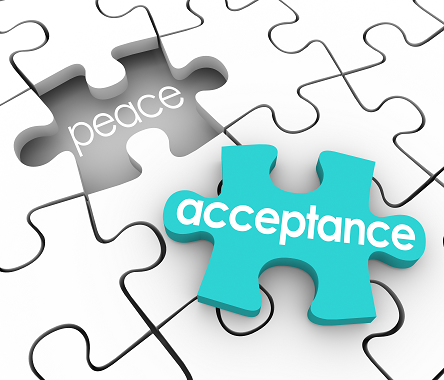Acceptance
Often referred to as ‘radical acceptance’ or unconditional acceptance. It is an extremely valuable skill for people living with borderline personality disorder (BPD) and those who support them.


Overview of acceptance
Acceptance involves fully and completely acknowledging and accepting reality as it is, without judgment or resistance, even if you don't like or agree with it. This means embracing the present moment, your feelings, thoughts, and circumstances, without trying to change or fight against them.
It is therefore a practical and pragmatic approach, which can be applied to almost any difficult situation. This is often a challenging skill to learn and will feel unnatural at first – start off with practising in relatively small situations. Over time, practising acceptance can help you build resilience and adaptability, as you learn to navigate life's ups and downs with greater equanimity.
Acceptance involves:
Recognition and acknowledgement
Recognising and acknowledging the reality of the current situation, including your emotions, thoughts, and the external events you may be facing. Acknowledging, that the current event/ thought/situation is something you have no control over and recognising that anything you do is unlikely to change the outcome. When you accept the reality of a situation, we can stop dwelling on whatever is happening that we have no control over and move on with our life.
Relinquish judgement
Encouraging you to let go of judgment or evaluation of your thoughts and feelings as good or bad, right or wrong. Instead, you accept them as they are without attaching value judgments.
Acceptance
Surrendering the struggle against reality. When you resist or deny what's happening, it often leads to more suffering and emotional distress. Acceptance helps you let go of this resistance.
Being present
Being fully present in the moment and observing your thoughts, emotions and sensations without trying to change them (or those of another person) accepting your emotions without judgment is helpful skill to regulate them. This means allowing yourself to feel your emotions without trying to suppress or amplify them.
A carer’s experience with radical acceptance
“For me, one of my most liberating experiences was when I unconditionally accepted that my daughter had BPD and that IN THAT MOMENT, she was unable to do anything different. I could accept that her distress and pain were very real for her and there may in fact be nothing I could do to change how she was feeling and that there was a real chance that she may harm herself as a way of coping. Whatever she was doing, she was doing the best she could and I too was doing the best I could in this moment. With this acceptance, I was able to move beyond the behaviours, to see and empathise with her distress and so have a clearer mind to use some skills manage my distress which in turn helped her to self-soothe.”
Summary of acceptance
Acceptance is balanced with the notion of willingness. Is there something you can change and are willing to do differently? Has what you have done in the past worked? If it hasn’t, is that likely to change or are you willing to try something new? Maybe you can think about sitting with difficult painful emotions? Is your family member with BPD at a point of being willing to make changes or do we need to consider where they are at?
Acceptance involves the consideration of:
- what you can change
- what you can’t change (another person), and
- what you are willing to change
Acceptance is to acknowledge reality for what it is. It does not mean that you like what is happening or how you are feeling. Instead, it means that you are willing to stop fighting whatever is happening. Consequently, you will not waste energy denying what is, or making something out to be that which it is not.
It's important to note that radical acceptance doesn't mean resigning yourself to a life of passivity or inaction. It's about starting from a place of acceptance and then making informed, deliberate choices about how to respond to your circumstances. It can be a valuable skill for improving emotional well-being, reducing suffering, and enhancing the quality of life.
